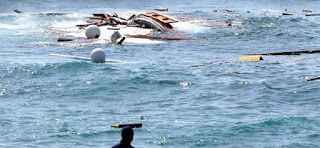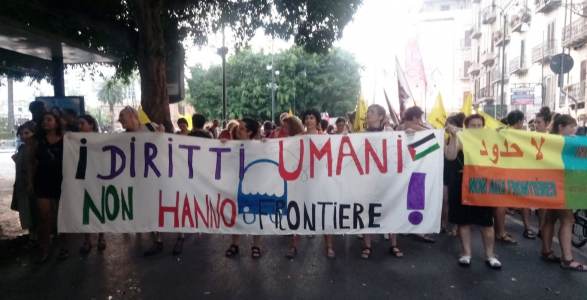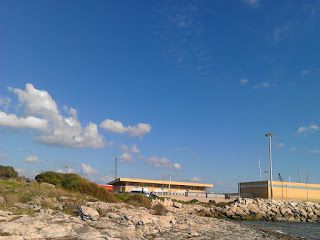Names for the “Mediterranean Missing”
It is
called “Mediterranean Missing”: a project organised by the
University of York, City University London and by the IOM, analysing
best practice and importance of the process of identifying the
bodies. Since the beginning of the year, 3,600 people have already
died at sea. “An invisible humanitarian catastrophe which deserves
dignity.”
It
is truly a silent massacre, which from the beginning of the year has
claimed 3,600 victims, or 6,600 once one counts those who have died
since January 2015.
Men, women and children in flight for a better future, who have lost
their lives at sea in the attempt to reach Europe. Today they
represent the new “Mediterranean missing”. Their bodies have been
buried in tombs without name in the cemeteries of Southern Italy.
Their families on the other side of the Mediterranean do not know if
they ought cry for their death or expect their return. But how is the
recognition of the bodies managed? Who deals with it and how? The
subject
is at the centre of the Mediterranean
Missing
project (‘Missing and Dead Migrants at the Borders of the EU in the
Mediterranean: Humanitarian Requirements and the Tasks of the
State’), organised by the Centre for the Study of Applied Human
Rights at the University of York, City University London and the IOM.
The research, which was present today, concentrates above all on the
methods by which the bodies are handled, in both a legal context and
relating to the practices of ensuring identification. The report is
based on 27 interviews with representatives from both local and
national institutions, as well as with civil society organisations.
An
invisible humanitarian catastrophe.
The project was created
based on
the necessity to restore dignity to so many, too many massacres which
are taking place everyday at sea, as Simon Robin explains, a
researcher at the University of York. “We have seen thousands of
people die at the southern borders of the Mediterranean. Since last
year we have arrived at a record number of 6,600 deaths. This is a
real but invisible humanitarian catastrophe”, he emphasises.
“When the Malaysian airlines plane disappeared, there was huge
media attention. At the same time, we are seeing a huge number of
migrants disappear, equivalent to five jumbo jets, but there is no
political or journalistic coverage. European member states are simply
ignoring the subject of effective identification, while we’re trying
to analyse and bring to light what are the best practices being
shown.”
Simply
numbers on Sicilian graves.
The manager of the project if a young Italian researcher, Giorgia
Mirto. “Visiting the cemeteries across Sicily one can see graves on
which are engraved only numbers instead of names” she confirms.
“The numbers remove the idea of personhood, while we must always
remember that behind every number is a person, a family who are
living in grief, those who do not know whether to cry for the missing
of hope for their loved ones’ return. The migrants who die and are
forgotten”, she adds, “comprise a generation who instead do
have a right to life, and to come to our country without risking
their lives.” The project has concentrated in particular on the
procedures established in Sicily for the recognition of the bodies.
As the researchers emphasise, an important watershed was the
shipwreck off Lampedusa on 3 October 2013, in which 387 people lost
their lives. This massacre (the anniversary of which is in only a few
days) changed the perception of the events into that of a mass
disaster, and brought attention to various protocols, as well as best
practices.
Angelo,
the police inspector who searches Facebook for the families of the
missing.
“In recent years, there has been a huge effort by some people
regarding this matter, from representatives of the state to legal
doctors” Mirto adds, “as well as normal police inspectors.” One
of these has been Angelo Milazzo who, from his office, has spent the
last few years going beyond the call of duty to try and provide names
to the missing. To this end he has also created a Facebook page,
along with the Syrian community, in which he attempts to contact the
families of the missing. This personal initiative has allowed the
identification of 22 bodies out of 24.
What
can be done? Among
the best practices, the Mediterranean Missing project emphasises the
crucial role of the office for Missing Persons entrusted to the
Extraordinary Commission of Vittorio Piscitelli, who took up the
cases of three shipwrecks which occurred on the 3rd
and 11th
October 2013, and 18th
April 2015. In these instances, the office set up a range of
protocols which have been proposed as guidelines for the management
of these kinds of situations. The documents have allowed, in
particular, the activation of forms of cooperation between the
relevant actors engaged in the recognition of the cadavers. According
to the researchers, the office’s role ought be extended beyond the
three cases cited. But above all, it ought become a coordinating
office for the establishment of uniform standards across the country.
The other crucial issue, according to the report, relates to the
families of the missing, who ought take a central role: not only
because “their place in the tragedy ought be recognised” but also
because this would facilitate the experts’ work in comparing data. Up
till today, however, there is very little ‘ante mortem’ data received
from victims’ relatives. In particular, the researchers propose that
more emphasis be placed on investigations. After a shipwreck the
survivors are in fact interrogated, but only in relation to punishing
the boat drivers, while very little data is collected in order to
understand who was on the boat, where they came from, if they were
alone or with a family. In the end, a transnational structure is
needed for the management of data relating to missing migrants:
databases shared between European states so as finally to be able to
give a name to so many who die nameless in the Mediterranean.
Eleonora Camilli
Project “OpenEurope” – Oxfam Italia, Diaconia Valdese, Borderline Sicilia Onlus
Translation: Richard Braude






